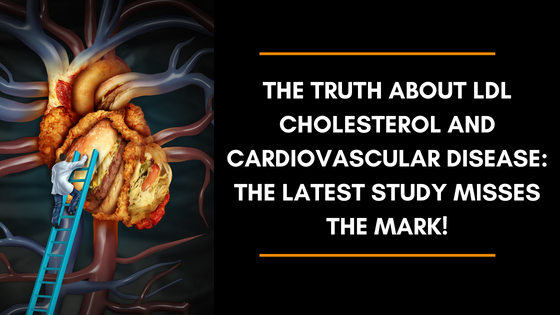During the American College of Cardiology (ACC) Scientific Session/World Congress of Cardiology (WCC) in 2023, Iatan et al. presented a recent study that suggested a link between a low-carbohydrate, high-fat (LCHF) “keto-like” diet and a doubling of the risk for future cardiovascular events. In promotion of the LCHF diet, Steven Nissen, a lipid expert at the Cleveland Clinic, cautioned against relying on the conclusions of the study, stating that the Low-density lipoprotein (LDL)cholesterol and apolipoprotein B (apoB) increase in the “keto-like” diet group was relatively small and “certainly not enough to produce a doubling in cardiovascular risk.”
Iatan et al. defined a low-carbohydrate, high-fat diet as less than 25% of daily energy from carbohydrates and over 45% of daily calories from fat. Follow the link to read the full article. Although this diet is similar to a strict ketogenic diet, it is not equivalent to it and could be considered a “keto-like” diet. Therefore, the study’s findings may not necessarily extend to a genuine ketogenic diet.It was observed that the study population consisted of mostly women, 73%, where the average age was 54. The participants following the LCHF diet had a higher average body mass index (27.7 vs 26.7) and a higher incidence of diabetes (4.9% vs 1.7%) compared to those following a standard diet. Results showed that those on the “keto-like” diet had significantly higher levels of both LDL cholesterol and apolipoprotein B (ApoB).
A limitation of the study by Iatan et al. is that participants provided dietary information at only one point in time, which should be considered when interpreting the study findings, Iatan said. Moreover, self-reports of food consumption can be inaccurate, though Iatan said this questionnaire has been extensively validated. In addition, because the study was observational, it can only show an association between the diet and an increased risk for major cardiac events, not a causal relationship. These observational findings should not be causally interpreted since the study is potentially affected by confounding factors, such as a greater frequency of diabetes and higher weight among participants on the “keto-like” diet. Moreover, the observed rise in LDL cholesterol levels in the “keto-like” diet group was not significant enough to be conclusively associated with cardiovascular events.
In the study, it is insinuated that LDL cholesterol may be linked to an increased risk for the development of cardiovascular disease. This topic, however, has been actively debated within the scientific community for years. LDL cholesterol, often referred to as “bad” cholesterol, is a type of lipoprotein that carries cholesterol from the liver to other parts of the body. Past research has suggested that LDL cholesterol may contribute to the formation of plaque within the arteries. Although, recent research may suggest otherwise. There is a growing body of evidence that questions the causal link between LDL cholesterol and cardiovascular disease. A paper written by Diamond & Ravnskov, and published in Expert Review of Clinical Pharmacology in 2018, argued that the traditional view of LDL cholesterol as the primary cause of cardiovascular disease is based on flawed science and incomplete data.
Current research has revealed that adopting a LCHF diet can enhance indicators of cardiovascular well-being, such as decreasing triglycerides, increasing HDL cholesterol, and reducing markers of inflammation. In 2019, the Journal of the American College of Cardiology published a study that analyzed over 24,000 participants and reported that a low-carbohydrate diet, even those rich in saturated fats, was not linked with a higher risk of cardiovascular disease. These results correspond with the efforts of those who support the low-carbohydrate, high-fat approach; a few notable figures include Prof Tim Noakes, Jeff Volek, Eric Westman, Gary Taubes, Dr Stephan Phinney, Dr Robert Lustig, and Dr William Davis.
One of the main concerns about LCHF diets has been the high fat content. For many years, fat was considered the cause of weight gain and the development of chronic diseases. However, the failure of low-fat diets to result in weight loss and significant health benefits has been demonstrated in previous studies. For instance, the Women’s Health Initiative report highlighted limitations in the recommendations for a low-fat diet, because on average, the women failed to lose weight or show significant improvement in risk for CVD or stroke. In popular knowledge and many professionals’ minds, the high fat content symbolizes significant increases in saturated fat. More recently, the association between dietary saturated fat and health outcomes has been re-explored. Furthermore, even in studies in which participants adopted a LCHF diet, their perception regarding their intake of saturated fat did not match their actual intake. In fact, a study by Feinman et al. highlighted that the most significant change in intake was an increase in non-starchy vegetable consumption. The average diet was high in non-starchy vegetables, low in fruit, and included only slightly more meat compared to the respondents’ baseline diet. LDL cholesterol has been the main atherogenic lipoprotein for the last few years. Nevertheless, LDL cholesterol is far more complex than currently understood by mainstream general medicine. Other lipoproteins such as HDL cholesterol or very low-density lipoprotein have shown repeatedly to play a role in atherogenesis. Isolated low HDL-C in people with normal LDL cholesterol and triglyceride levels has been seen as equivalent to elevated LDL cholesterol as a coronary risk factor. Further research is urgently needed in this matter of lipidology to progress the understanding of this area and particularly help diffuse some of the controversy around saturated fat, LDL and cardiovascular outcomes while following LCHF diets.
The study by Iatan et al. does not provide conclusive evidence suggesting that an LCHF diet, including a ketogenic diet, increases the risk for future cardiovascular events. It is important to note that as inflammation and endothelial dysfunction, may worsen or exacerbate the development of cardiovascular disease in certain individuals. Further research is needed to determine the long-term effects of an LCHF diet and other diets on cardiovascular health.
![]()




